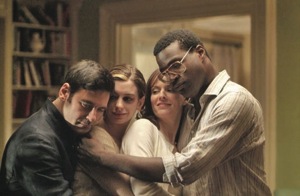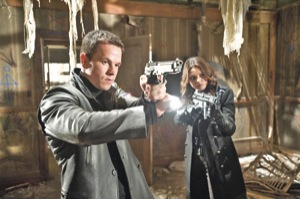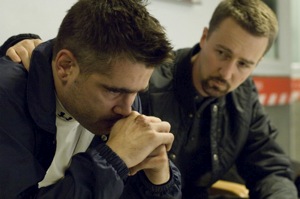-
- Admirals, generals: Repeal ‘Don’t Ask, Don’t Tell’
- Criticism mounts among gays over California ban
- Woman who got HIV in transplant sues Ill. Hospital
- Gay advocates upset at shelving of Chicago school
- NJ same-sex marriage political debate looms, but when?
- Gay arts group sues Milwaukee for discrimination
- National News Briefs
- World News Briefs
arts & entertainment
Movie Reviews
Published Thursday, 27-Nov-2008 in issue 1092
‘Rachel Getting Married’
Review: Anne Hathaway hits it out of the park with a winning portrait of a young woman in crisis in this funny, sad and very truthful story of a dysfunctional family trying to come together for a wedding celebration.
Story: Shot in a nervous, intrusive style, Rachel Getting Married is a blistering portrait of a family during a tension-filled wedding weekend. The long-simmering conflicts come to the surface at an event that’s supposed to be about good times. Actually, the title is a bit of a misnomer since although it is indeed Rachel (Rosemarie DeWitt) getting hitched, the plot really revolves around her troubled sister Kym (Hathaway), who comes straight from a stint in rehab to the family gathering. In attending the wedding, she brings a boatload of personal issues – sibling and parental resentments and a whole host of other problems guaranteed to make everyone in the room uncomfortable. This all comes to a head early on at the pre-wedding dinner at which she makes an awkward, piercing toast that puts the entire place on edge. It doesn’t help that her father (Bill Irwin) is rather weak and overprotective, and her mother (Debra Winger) is now remarried and has moved on to a different kind of life – disconnected from her daughters emotionally. The wedding, a Hindu ceremony, becomes a catalyst for personal confrontations that finally break out into the open.
Acting: The ensemble cast assembled by director Jonathan Demme is simply unbeatable – led by a breakthrough performance from Hathaway. Her wry ironic humor, internal self-loathing, seething conflicts and heartbreaking emotional vulnerability are all the by-products of a young woman who desperately needs to be embraced. This is a major acting turn, and those who only think of Hathaway from Ella Enchanted and The Princess Diaries are going to be surprised to see the emergence of an actress who is the real thing. As her sister Rachel, DeWitt, who also was impressive as the mistress in season one of “Mad Men,” doesn’t get to take center stage but has several strong moments. Watch out for this one. Irwin and Winger prove the meaning of the word “pro” in their limited screen time. In just a couple of big scenes, Winger totally nails the mother and her need to distance her relationship with her own family. You only wish the part was fleshed out a little more, especially since great roles for Winger seem to be few and far between these days. Irwin is equally impressive, likeable but clueless as far as the real drama playing out between his daughters. This Tony-winning Broadway veteran gives us a lifetime of information about his character in just a few scattered moments.
Direction: The Oscar-winning Demme (Silence of the Lambs, Philadelphia) has spent the last few years doing documentaries and concert films, so it’s nice to report he’s got his mojo back with his first narrative film since 2004’s The Manchurian Candidate remake. Actually Rachel seems influenced by some of his recent nonfictional work with a documentary style approach to screenwriter Jenny Lumet’s somewhat conventional scripting. The use of hand-held cameras is pervasive and has the intended effect of bringing out raw emotions in the kind of cinema verite Robert Altman often employed. In a nod to the obvious inspiration, the late Altman is thanked in the end credits. Demme’s in-your-face filmmaking might be oft-putting to some members of the audience, but it effectively heightens the reality of the piece, separating Rachel from the pack. Ultimately, this is a performance piece, and Demme has brought out the best of his cast of fine actors gaining award-worthy turns.
Bottom Line: Hollywood.com rated this film 3 1/2 stars.
‘Max Payne’
Review: For fanboy devotees of the video game on which it is based, Max Payne is pure pleasure. But everyone else may not want to take this walk on the dark side.
Story: Max Payne started life as a popular 2001 video game and now the dark, dreary material has morphed into feature film that tries to give a back story for the tortured title character. Payne’s (Mark Wahlberg) wife and newborn baby are tragically killed and now Max, a DEA agent, is involved in the investigation of a series of murders that could provide a link to solving the mystery of his family’s demise. Demons, in the form of a winged serpents, haunt Max – but nothing real or imagined will stand in the way of his quest. He teams with a beautiful Russian mobster and assassin, Mona Sax (Mila Kunis), whose sister Natasha (Olga Kurylenko) is also killed, giving equal reason to seek revenge. Complicating matters is Max’s mentor B.B. (Beau Bridges), an ex-cop who now does security for a large pharmaceutical company which may hold the key to the mystery. Forces – both real and hidden – are hard at work to keep Max, who is clearly fighting his inner demons, from reaching his goal.
Acting: Wahlberg is earnest and knows how to kick ass, but the murders of his young wife and baby, which is meant to give emotional heft to the character, is really not enough to connect us to this guy. Still, he does quite nicely in the numerous action scenes and is at home playing a DEA agent. Mila Kunis, so appealing in Forgetting Sarah Marshall, shows a saucier side here and has great potential as an action mama, perhaps the kind of ball-buster Aeon Flux should have been. Olga Kurylenko, who is also in the new James Bond film Quantum of Solace is well-used in the few scenes she has, and Amaury Nolasco of “Prison Break” is convincing as a tough ex-vet who now has drifted into the drug underworld. Beau Bridges has a tricky role he pulls off without tipping the story over, while the other Bridges in the film – rapper-turned-actor Chris “Ludacris” Bridges – is an Internal Affairs detective who seems to sense something serious going on with Max.
Direction: John Moore has been clearly influenced by the Matrix and new Batman movies, creating a dark and ominous New York City with winged creatures reminiscent of the mythological Valkyrie roaming the grey skies. These creatures are apparently meant to physically represent the tortured thoughts in the mind of Max Payne. This creature feature aspect does not exist in the video game, and it’s an interesting, if not entirely plausible addition, from the mind of writer Beau Thorne. Moore invests his visuals with equal doses of reality and fantasy in an uneasy mix that has you wondering what’s real and what’s Memorex. Subjective POV camerawork and slow-motion shots sometimes give us the feeling we are watching Matrix, but the stylistic touches do seem to be in line with the character’s journey. Moore has laid on the visual effects effortlessly, particularly in the creation of the creatures who haunt Payne’s subconscious life.
Bottom Line: Hollywood.com rated this film 2 stars.
‘Pride and Glory’
Review: As a gritty and intense movie about a police family caught up in a NYPD corruption scandal, it finds real “Pride and Glory” in its superb cast.
Story: Merging Serpico with an almost Shakespearean sense of tragedy, Pride and Glory details an extremely complicated investigation into the gunning down of four New York City cops after an attempted drug bust goes terribly wrong. With increasingly bad PR and an apparent cop killer still at large, the Chief of Manhattan Detectives Francis Tierney Sr. (Jon Voight) assigns his son Detective Ray Tierney (Edward Norton) to lead the probe. The younger Tierney is reluctant since he knows all four cops served under his brother Francis Jr. (Noah Emmerich) and brother-in-law Jimmy Egan (Colin Farrell). Ray’s instincts may be right because as he digs deeper he discovers an awkward and uncomfortable connection between Francis, Jimmy and the case. Could his own family have been involved in an inside job and tipped off the drug dealers? Soon, Ray finds himself having to choose between the greatest moral dilemma of all: loyalty to the job or loyalty to his family.
Acting: Although Pride and Glory doesn’t break any new ground and is composed of elements we’ve seen in many previous films dealing with police corruption, this film is distinguished by some of the finest work in the storied careers of many of its cast. Norton follows up his summer comic-book movie The Incredible Hulk with a far smaller and more focused character in P&G, playing a man caught in a moral bind facing the unthinkable prospect of going after his own family members. Norton wears his ticklish predicament on his face and is enormously effective conveying pure angst. Emmerich (Little Children) delivers a rich portrayal of a tortured soul, not only caught up in an intense investigation, but dealing with a wife (Jennifer Ehle) dying of cancer. Farrell is better than he has been in some time, playing a shady officer who seemingly will stop at nothing to get what he needs. Voight, as the proud family patriarch and veteran of the NYPD, clearly understands the dilemma of this man who is watching his family torn apart.
Direction: Co-writer/director Gavin O’Connor has spent a frustrating couple of years trying to bring this story to the screen, but his perseverance pays off. Pride and Glory is a well-written cop tale that co-exists as an interesting character study about the power of family ties vs. personal pride. O’Connor manages to put us right in the center of the moral conflict at the heart of his story and with several first-rate actors (even in the lesser roles) crafts a film that seems authentic to its core. Incorporating Declan Quinn’s in-your-face, realistic cinematography, O’Connor resists going for a more obvious audience-pleasing flashier style, achieving a look and feel that seems more grounded in the milieu he’s trying to capture. His script, co-written with Joe Carnahan (who wrote and directed the equally gritty Narc) is tight and unsympathetic, slowly letting layers of a very intricate and complex story peel away to reveal a core that packs a punch right to the gut.
Bottom Line: Hollywood.com rated this film 3 stars.
‘Quantum of Solace’
Review: Tons of chases and the shortest running time of any 007 flick, you won’t be bored but it’s more Bourne than Bond this time.
Story: Shedding many of those trappings that make a James Bond movie, well, a James Bond movie, Quantum of Solace is really the first sequel ever in the long-running series. While it’s always exciting, something gets seriously shaken and stirred in the translation. Picking up exactly where the brilliant Casino Royale left off, we see Bond (Daniel Craig) trying to get to the bottom of why his love Vesper Lynd had to die, jumping right into the first of many, MANY chases as he traverses six countries. Still on rogue patrol, Bond then inadvertently meets the crafty and gorgeous Camille (Olga Kurylenko), who introduces Bond to the evil Dominic Green (Mathieu Amalric), the head of an eco-phony stealth operation angling for some prime desert land while financing a crooked Bolivian general’s planned coup. With the ever resourceful M (Judi Dench) trying to keep him in line at all times, Bond must put his revenge plans on hold, as he crosses paths not only with Greene and his fake pro-environment front but also the intriguing and mysterious group known as Quantum.
Acting: In this outing, Daniel Craig – leaner and meaner than any previous Bond – really becomes a man of single-minded determination and grit. He’s less like the James Bond we know and love and more a humorless killing machine like Jason Bourne (those two should really get together). Still, Craig is such a compelling actor that we are with him all the way even if he doesn’t go for the suave Bond moves. Olga Kurylenko is a great foil but not totally in the tradition of a Bond girl. A later encounter with Gemma Arterton, as a British agent in Bolivia, does, however, briefly recall the heyday of Goldfinger. Judi Dench has taken the perfunctory role of M and turned it into a full-blown supporting role. Her dry wit and take-no-prisoners attitude is welcomed every time she shows up on screen. French star Mathieu Amalric (The Diving Bell and the Butterfly) doesn’t really pull off his villainous alter-ego ecologist, while Jeffrey Wright is pretty much wasted as U.S. agent Felix Leiter. At least, Giancarlo Giannini returns for some nice moments with his Craig.
Direction: Although they usually leave the challenging job of steering the Bond ship to an English director, oddly this time the baton was handed to Marc Forster, known more for his intimate dramas such as Finding Neverland and Monster’s Ball. His grip on the action sequences is secure, but he never really seems to have a handle on what distinguishes this legendary movie spy from everyone else. There’s a reason Bond has survived as a screen icon for almost half a century, but the sort of workman-like filmmaking Forster displays here does not represent 007’s finest hour. It’s almost like the producers had a checklist: car chase on winding roads; boat chase; airplane chase; rooftop chase – all check. Quantum of Solace is definitely worth checking out, however. I mean, it IS Bond, and we wait for these movies on bated breath. Just maybe next time, a little less Bourne, please.
Bottom Line: Hollywood.com rated this film 3 stars.
|
|
Copyright © 2003-2025 Uptown Publications





